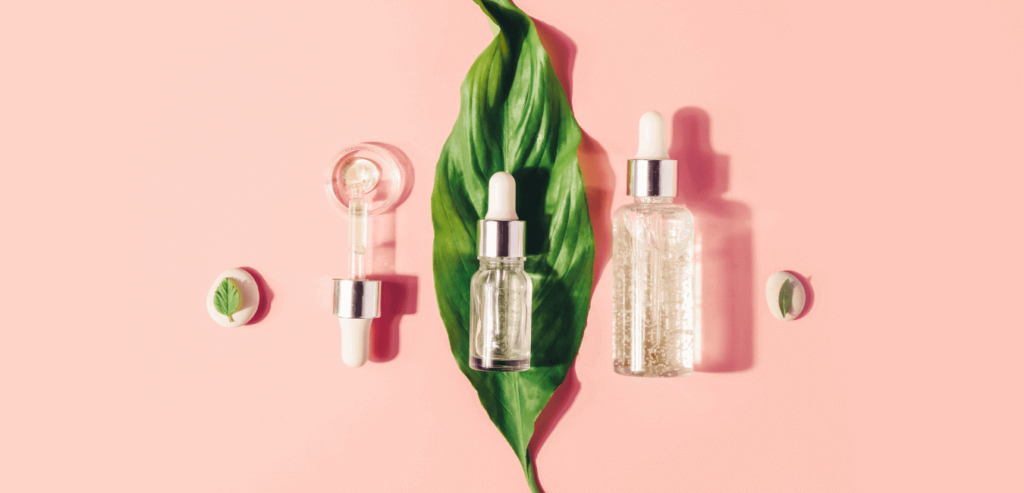Whenever you’re talking about these two ingredients in the same breath, there’s one omnipresent question that is always lurking around; do you use hyaluronic acid before or after vitamin C? Most importantly, what goes first, vitamin C or hyaluronic acid? You see, the truth is that both of these are noteworthy and important in their own right. In fact, their individual powers (as far as skincare is concerned) quadruples when you combine them. They can hydrate and brighten your skin to make it look flawless and glamorous in ways you have never imagined. Nonetheless, knowing whether to use vitamin C before or after hyaluronic acid is part and parcel of this question.
In the discourse of hyaluronic acid vs vitamin C, there’s one thing that skincare experts1 and dermatologists all agree on—using them together has the potential of creating an enormously effective skincare regimen. And the best part of it? Unlike other skincare ingredients, these two appear to complement rather than cancel each other. So whether or not you choose to use vitamin C before hyaluronic acid, you can be sure that you won’t be missing out on ascorbic acid’s impressive antioxidant properties.

Speaking of which, in the vitamin C vs hyaluronic acid debate, there are certain unique skincare properties that each of these can impart to your dermatological health that you are not likely to get else. Vitamin C, for example, is a potent antioxidant that has been shown to be able to visibly improve wrinkle lines and even out hyperpigmentation. Not to mention that ascorbic acid has a renowned anti-aging effect thanks to its ability to boost the production of elastin and collagen. Besides, vitamin C has been observed to be key in improving or reversing the damage that UV radiation leaves behind on one’s skin. And being an antioxidant, it should not come as a surprise that the vitamin has a way of neutralizing the effects of free radicals that have over time been linked to premature aging and unsightly wrinkles.
Secondly, even before delving deeper into “Can I use hyaluronic acid with vitamin C?” debate, it is imperative to point out that hyaluronic acid is a skincare ingredient that has over time earned the recognition of dermatologists for very solid reasons. For one, hyaluronic acid is a humectant. In other words, it is able to hold as much as 1000 times its molecular weight in good old plain water. This makes it an excellent addition to any skincare regimen for mature or dry skin, especially if you are trying to boost hydration and improve your skin’s elasticity. It’s no wonder that some of the best anti-aging products in the market, such as Maryann’s Vitamin C Serum, is infused generously with hyaluronic acid.
Table of Contents:
Can I Use Hyaluronic Acid with Vitamin C?
The truth is that not all potent skincare ingredients can be used together. So, if you are presently wondering, can you use hyaluronic acid and vitamin C serum together? Your concerns are rightfully justified. That being said, using hyaluronic acid and vitamin C together is not just safe, but highly encouraged as well. Apparently, when they are paired together, these two ingredients provide both lasting and immediate results that have revealed notable dermatological benefits such as:
- Improved skin brightness
- Visibly reduced and less conspicuous wrinkles
- More hydrated and less ashy skin

And this is just scratching the surface. The value of using the two ingredients, without even worrying about pertinent questions such as, “Can you mix hyaluronic acid with vitamin C” is momentous. The combination has a way of making your complexion appear smoother, fuller, plumper, and, ultimately, more youthful.
How to Use Hyaluronic Acid and Vitamin C Serum?
Here’s the thing; as much as it is important to know the exact products to use for your skin, it is even more indispensable to know how to use them in the right order. Use them in the wrong fashion, and you could worsen the very symptoms that you are aiming to eliminate rather than improve them. When it comes to how to use hyaluronic acid and vitamin C serum, the idea is to find a formula that combines both ingredients expertly and saves you the headache of having to apply each of them separately. An ideal example of a formulation that has been pre-prepared for you is Maryann’s Vitamin C Serum with Hyaluronic Acid.
However, if you are looking for the correct way to use vitamin C and hyaluronic acid separately, then here’s how to use vitamin C serum and hyaluronic acid individually. The rule of thumb here is based on the idea that formulas ought to be used based on their individual consistency. In other words, apply your skincare ingredients starting from the thinnest all the way to the thickest. This implies that oils should always come before liquid moisturizers and, obviously, after serums. For this reason, there’s no hard-fast rule on when to use hyaluronic acid and vitamin C serum. All of this is dependent on the exact product that you will be used to extract these two ingredients.

To be clear, if you are relying on a thick moisturizer to infuse hyaluronic acid into your skin, then it should go without saying that the cream ought to be applied right after smearing in a vitamin C serum. In similar tandem, a hyaluronic acid serum should come before a regular face cream that incorporates vitamin C in its formulation.
So, to answer the question, “Can I mix hyaluronic acid with vitamin C?” Yes, you can. Nonetheless, the order in which you use them will be mainly determined by the consistency and thickness of each individual serum, in the case you decide to use them separately. Apply whichever serum/lotion is thinner and less dense first. Not just for these two ingredients, but for every other skincare formula that you plan on using in the future.
In Closing
Now that you know what goes first, vitamin C or hyaluronic acid, it’s critical to point out that you are much more likely to reap extraordinary results from using a pre-mixed and certified vitamin C and hyaluronic acid formulation than attempting each of them separately. Remember, if done the right way, the combination of these two incredible ingredients can function as a worthy alternative to retinol, particularly for those with skin that is prone to purging.

